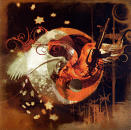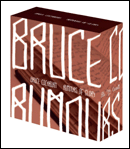All day the mountains rose behind a veil of smoke from burning fields
And road dust dyeing black skin bronze and the road rolling like a rough sea
It's quiet now, just crickets and a dog fight somewhere in the far away
In my heart I hold your photograph
And the thought of you comes on like the feel of the coming rains
Hot breeze ran its fingers through the long grass of a thatched roof eave
They stuck me in the only chair they had while they cooked cassava
And a luckless hen
They asked for one well three lanterns and 200 litres of fuel and
I said, "Who, me?"
And the time for planting's coming soon
And the thought of you comes on like the feel of the coming rains
In the town neon flickers in the ruins
Seven crows swoop past the luscious moon
If I had wings like those there'd be no waiting
I'd come panting to your door and slide like smoke into your room
All day the mountains rose behind a veil of smoke from burning fields
And road dust dyeing black skin bronze and the road rolling like a rough sea
It's quiet now, just crickets and a dog fight somewhere in the far away
In my heart I hold your photograph
And the thought of you comes on like the feel of the coming rains
And the time for planting's coming soon
And the thought of you comes on like the feel of the coming rains
Musicians:
Bruce Cockburn: Dobro and Electric Guitars and Vocal
Gary Craig: Drums, Tambourine
Rob Wasserman: Bass
Gary Burton: Vibes
Maria Muldaur, Jonatha Brooke and Patty Larkin: Vocals
Known comments by Bruce Cockburn about this song, by date:
17 December 1995
"So having been to Africa for that [referring to 'Joy Will Find A Way'], I'm going
to throw a new song at you that comes from there. I was in Mozambique a few
weeks ago looking at the issue of land mines which is another story,
and probably not really a Christmas story, although it is worth sparing a thought
for that situation through this season. Its an ongoing problem that will be ongoing for
some time, not just in Mozambique but in a lot of places. But, the difference....I was in
Mozambique in '88, and you couldn't travel anywhere 'cause the war was going
full blast. And it was just a series of island cities basically. You
had to fly from one to the other. But now that the war has been over for a couple of
years the roads are open and, for the most part, have been cleared of mines. Its pretty rough
going, but you can get from city to city. And it was quite marvelous to be able
to do that in a country that I'd only had an urban experience in before. So this
song has a little bit of that in it, and a few other things. Its
called 'The Coming Rains'.
--spoken intro to The Coming Rains from the fifth annual 'Christmas
With Cockburn' show on the Columbia Radio Hour, Sony Music Studio,
New York City, 17 December 1995. Submitted by Jeffrey Dreves (2006).
December? 1996
Hearsay: A lot of your songs revolve around movement and have a 'travelogue' quality...
BC: There's a lot of different aspects to travelogue but one of the important ones is the way it can kick you out of your habits of mind, and I think being regularly kicked out of your habits of mind is very important, vital really, from a creative point of view. Some people get that from drugs or indiscriminate sex but in my case it's been mostly through travelogue! It's a common human thing to fall into an habitual way of thinking about things that needs to be stirred up every now and then - we need to keep having these little cultural revolutions, and travel has occupied that function for me more than anything else. There's a lot of material that comes specifically from certain travels. On the new album, the Mozambique trip inspired two songs. The obvious one is The Mines Of Mozambique but also The Coming Rains was written there. Journeys to exotic places don't always produce songs, but sometimes they do.
-- from "Tender is the Night", Hearsay Magazine, Vol. 14b, December? 1996. Anonymous Submission.
18 July 1997
"This is a song that, is kind of a combination landscape and love song. Um,
[in a low sexy voice] "the landscape of luv...." Actually not. The landscape
of not having love is more like it. The physical landscape in the song
happens to be that of Mozambique and it's a song that I wrote there a couple
of years ago or nearly that now...the fall of '95. And it, I suppose some of
it, bears a little bit of discussion. It's going to be a very one sided
discussion though because I'm not taking questions, but [laughter] I was
there in '88 and at that time you couldn't travel around the country, you
could only fly from city to city because everything between the cities was a
war zone and the war that was going on was a particularly brutal, vicious
kind of thing. So I didn't really get to see very much countryside in
Mozambique although I saw some very interestingly surreal urban scenes but,
this time the war had been over for a couple of years and you could in theory
at least, travel around. The roads were in the condition you might expect
after 25 years of warfare and a lot of explosions and trenches and that sort
of thing so it was difficult, but you could get around. At one point I ended
up in a tiny village where the old folks were sort of poking me and
saying,"Hey I'm really glad you are here because the little kids have never
seen a white person" and then they would sort of go to the little kids, "See,
that's what they look like. That's one there".
And I was with some, a couple of other people. One other Canadian and a
couple of Mozambicans who were overseeing a development project that involved
this village. And because I was the most exotic and the least familiar with
Mozambique and the one that, from furthest away, except for the other
Canadian, I got to sit in the only chair they had in the village. They went
and got that, it took about a half an hour while we stood around and wondered
what they were doing and they showed up with this wooden sort of school
chair, you know, put it under the big shade tree in the middle of the village
and said "sit on it" and, so I did, you know not wanting to give offense, and
shortly there after I see that they are preparing lunch in the form of....a
kid is running after a hen...which he subsequently caught and pulled it's
head off and prepared it for eating, while we were sort of kept in
conversation with the village folks. And after they had given us lunch and
they, they are not used to seeing white people or, especially Canadians I
suppose, in that part of Mozambique. But they're no fools and they know that
if you can afford a plane ticket to afford to get from where ever the hell
you came from to this little village in the middle of the bush, you must be a
source of more than just teaching the kids what a white person looks like.
And often they are right of course, they are right most of the time, so they
get in the habit of approaching you for things that they might need and, of
course, in my case they were conspicuously barking up the wrong tree but I
couldn't really explain that to them very well so... I suppose I'm telling
you all this by way of exercising the guilt I feel for not having explained
it to them. Anyway, this is called The Coming Rains."
-- from a concert at Inter-Media Art Center, Huntington, NY, July 18, 1997. Transcribed and submitted to the project by Doug Stacey.
November 1997
Bob Doran: Was your travel to Mozambique also with Oxfam?
BC: Oxfam was one of 16 organizations working under an umbrella agency. I first went there in 1988 when that group was first set up, then back again in '95. It was the second trip that produced the two songs on the album: The Coming Rains and Mines of Mozambique."
-- from "A Conversation with Bruce Cockburn", by Bob Duran, North Coast Journal, November 1997. Submitted by Bobbi Wisby.
Help out! To add material to this section, see this page first.
Song Index | Alphabetical Song Index | Chronological Song Index
This page is part of The Cockburn Project, a unique website that exists to document the work of Canadian singer-songwriter and musician Bruce Cockburn. The Project archives self-commentary by Cockburn on his songs and music, and supplements this core part of the website with news, tour dates, and other current information.



